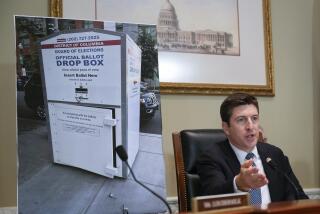House Votes Inclusion of Illegal Aliens in ’90 Census
- Share via
WASHINGTON — In a victory for California and other states with large immigrant populations, the House Wednesday rejected a Senate-passed proposal to bar the Census Bureau from counting illegal aliens.
In the vote, the House turned aside the pleas of members from Northeastern and Midwestern states whose districts are losing population, and thus could be eliminated by the 1990 census.
The action came on a procedural move that blocked Rep. Tom Ridge (R-Pa.) from offering a proposal to exclude aliens from the upcoming census. The vote was 232 to 184.
Ridge’s proposal had been intended to influence members of a House-Senate conference committee who are currently debating the scope of the census as part of a spending bill for the Commerce Department, which includes the Census Bureau. Defeat of the Ridge proposal is expected to persuade conferees to make no changes in the census.
Moreover, Commerce Secretary Robert A. Mosbacher has said that he would advise President Bush to veto any legislation from Congress seeking to alter the Census Bureau’s traditional practice of counting “all persons in each state”--including aliens.
Opponents of the proposal to exclude illegal aliens argued that such a strategy would be unworkable and unconstitutional and that it would undermine the accuracy of the census. But Ridge and his supporters maintained that the millions of aliens who live in this country illegally have no right to be counted and should have no role in determining the political makeup of the House.
It was no coincidence that most of the House members arguing for a change in the census were, like Ridge, from states that are expected to be allotted fewer seats in the House as a result of the reapportionment that occurs after every census. Ridge also has brought a lawsuit in Pittsburgh challenging the counting of illegal aliens.
But not all of those members facing possible political extinction supported Ridge.
Rep. William D. Ford (D-Mich.), who spoke in favor of the current system, declared: “You are looking at one of the most likely seats to be lost.” He charged that it was “a fantasy” of some members that a change in the census would substantially alter the result of a massive population shift to the South and Southwest--a shift that has altered the political map.
Ford argued that it has always been the practice of the Census Bureau to count every person residing in the country on April 1, the first year of each new decade, no matter who they are.
“They could be Martians visiting from another planet,” he said. “If they’re here on April 1, they get counted.”
Nevertheless, Rep. Jan Meyers (R-Kan.) questioned why the Census Bureau does not count many foreign diplomats residing legally in the United States, while at the same time counting aliens who are here illegally.
“This is not the Constitution according to James Madison, but Lewis Carroll,” she said, referring to the author of “Alice’s Adventures in Wonderland.”
Many members noted that the accuracy of the Census would be destroyed if the government sought to exclude illegal aliens, since many people being questioned could not be relied upon to accurately assess their status. Census-takers, who are low-paid, part-time workers, would be called upon to make complex legal judgments about the persons being interviewed.
“This would require census-takers to become de facto (Immigration and Naturalization Service) agents,” Rep. Frank McCloskey (D-Ind.) remarked.
Other opponents of Ridge’s proposal cited the cost and inconvenience of making such as change now, with so few months left before the census is to take place. Rep. Tom DeLay (R-Tex.) noted that the Census Bureau already has spent $44 million to print 170 million questionnaires that would have to be thrown out if the rules are changed.
But Rep. Bill Goodling (R-Pa.), co-sponsor of the Ridge proposal, exploded in frustration at the suggestion that he should wait another 10 years to change the way the census is taken. He said that he was told the same thing a decade ago and his father, who preceded him as a member of the House, heard the same argument 20 years earlier.
Goodling called on Congress to make the change now and allow the courts to determine the constitutionality of excluding illegal aliens. Otherwise, he said, the courts will continue to refuse to rule on the matter.
No matter how the issue is resolved this year, both sides agreed that it is likely to be debated again before the census in the year 2000. Rep. Bill Richardson (D-N.M.) called it “the civil rights vote for the Hispanic community in the years ahead.”
Federal aid to states frequently is based on population, which means millions of dollars in grants and other funds made available on a per capita basis could be involved in the census decision. Ridge’s proposal would have allowed aliens to be counted for the purpose of dispensing federal dollars but not for reapportionment.
More to Read
Get the L.A. Times Politics newsletter
Deeply reported insights into legislation, politics and policy from Sacramento, Washington and beyond. In your inbox twice per week.
You may occasionally receive promotional content from the Los Angeles Times.










